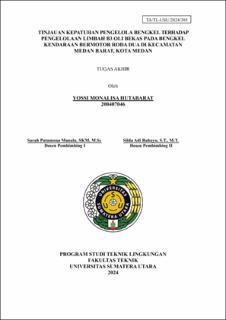Tinjauan Kepatuhan Pengelola Bengkel terhadap Pengelolaan Limbah B3 Oli Bekas pada Bengkel Kendaraan Bermotor Roda Dua di Kecamatan Medan Barat, Kota Medan
Overview of Compliance of Workshop Managers Towards Management of B3 Waste Used Oil in Two-Wheel Medan Barat District, Medan City

Date
2024Author
Hutabarat, Yossi Monalisa
Advisor(s)
Manalu, Sarah Patumona
Rahayu, Silda Adi
Metadata
Show full item recordAbstract
The number of two-wheeled motorised vehicle workshops in West Medan Sub-district is the highest compared to other sub-districts in Medan City. One of the activities in the workshop, namely the use of oil, has the potential to have an impact on the environment in the form of used oil waste, which includes Hazardous and Toxic Waste (B3). The objectives of this study were to analyse the amount of hazardous and toxic waste generation, especially used oil from two-wheeled motor vehicle workshops in West Medan Sub-district, Medan City, analyse the level of compliance in the management of used oil waste based on applicable regulations, and provide proposals and suggestions for used oil management. The approach used is a mixed approach. The researcher will observe by conducting an assessment through an assessment sheet at the research location and classify it based on a category. Researchers will calculate the generation of B3 waste, namely used oil in motor vehicle workshops based on SNI 19 - 3964 - 1994 and consider correction factors. The average result of used oil generation obtained in West Medan Sub-district is 4.5 litres/day or 3.8 kilograms/day. The compliance level of workshops in West Medan Sub-district is 9.26%, which is categorised as only a ‘small part’ of the compliance level in the management of used oil B3 waste carried out in workshops. Storage should use 200-litre drums. Storage is carried out in a separate room with storage duration maximising the capacity of the container used. The handover of hazardous waste to licensed hazardous waste collectors and the transportation of used oil waste can be carried out using closed conveyance by paying attention to prevent spillage of waste into the environment during the transportation process.
Collections
- Undergraduate Theses [404]
